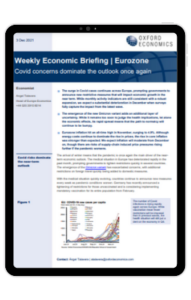Eurozone weekly economic briefing | Covid concerns dominate the outlook once again

The surge in Covid cases continues across Europe, prompting governments to announce new restrictive measures that will impact economic growth in the near term. While monthly activity indicators are still consistent with a robust expansion, we expect a substantial deterioration in December when surveys fully capture the impact from the latest wave.
What you will learn:
- The emergence of the new Omicron variant adds an additional layer of uncertainty.
- While it remains too soon to judge the health implications, let alone the economic effects, its rapid spread means that the path to normalcy will continue to be bumpy.
- Eurozone inflation hit an all-time high in November, surging to 4.9%. Although energy costs continue to dominate the rise in prices, the rise in core inflation was stronger than expected.
Tags:
Related Services

Post
Eurozone: Little sign of harm from the Red Sea disruptions
The impact of Red Sea shipping disruption on the eurozone economy continues to be limited, in line with our baseline view. Our new Eurozone Supply Stress Indicator suggests that supply pressures have returned to normal following a period of easing in 2023.
Find Out More
Post
GCC: Key themes shaping city economies in the near term
For Gulf cities, the near-term outlook will be tied not only to the global macroeconomic backdrop, but also the progress of the diverse visions and strategies in the region. With the aim to diversify their economies and reduce the dependence on oil, Gulf states continue to invest in the non-oil economy and implement various reforms. That said, oil revenues remain key to funding diversification efforts.
Find Out More